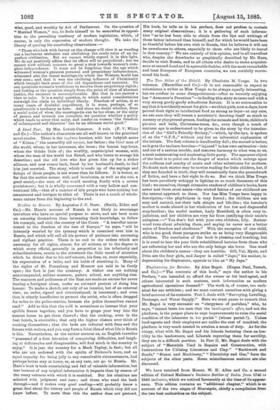Studies in Russia. By Augustus J. C. Hare. (Smith, Elder,
and Co.)—Mr. Hare's account of Russia is not likely to encourage travellers who have no special purpose to serve, and are bent more on amusing themselves than increasing their knowledge, to follow his example, and visit the country of the Czars. "A traveller accus- tomed to the freedom of the rest of Europe," he says, " will be intensely worried by the tyranny which is exercised over him in Russia, and which will call all his powers of patience into unceasing and vigilant practice. There is no end to the orders which are necessary for all sights, almost for all actions, or to the degree in which every official, generally in proportion to his inferiority and subordinateness, exacts to the uttermost the little mead of attention which he thinks due to his self-esteem, his fees, or, more especially, his expectation of a bribe, and his habit of receiving it. Many of the sights of St. Petersburg and Moscow are said to be freely open ; the fact is just the contrary. A visitor can see nothing unaccompanied, neither museum, palace, school, nor anything else. The manners and politeness of the East are made an excuse for never leaving a foreigner alone, under an outward pretext of doing him honour. To make a sketch, not only of an interior, but of an external view, an order, signed and countersigned, is necessary ; and even then is utterly insufficient to protect the artist, who is often dragged for miles to the police-station, because the police themselves cannot read." Add to this that the cold is sometimes so intense that your eyelids freeze together, and you have to grope your way into the nearest house to get them thawed ; that the cooking, even in the best hotels, is execrable ; that only the higher classes ever think of washing themselves ; that the beds are infected with fleas and the forests with wolves, and you may form a faint idea of what life in Russia is like. Nevertheless, as the author assures us, an English traveller " possessed of a firm intention of conquering difficulties, and laugh- ing at deficiencies and disagreeables, will find much in the country to enjoy." It is just the country for a Mark Tapley, in fact; but all who are not endowed with the spirits of Dickens's hero, and an equal capacity for being jolly in any conceivable circumstances, had perhaps better stay at home, or, at any rate, not go to Russia. Mr.
Hare's book is both entertaining and full of valuable information, but less because of any original information it imparts than by reason of the many extracts with which it is enriched. But his citations are selected with judgment and care; and those who read the book through—and it makes very good reading—will probably know a great deal about the history and people of Russia which they did not knOw before. To more than this the author does not pretend. His book, he tells us in his preface, does not profess to contain many original observations ; it is a gathering of such informa- tion " as he has been able to obtain from the lips and writings of those better informed than himself, and for which he would have been so thankful before his own visit to Russia, that he believes it will not be unwelcome to others, especially to those who are likely to travel in that country." We are entirely of this opinion, and to all travellers who, despite the drawbacks so graphically described by Mr. Hare, decide to visit Russia, and to all others who desire to make acquaint- ance at second-hand and in agreeable fashion with the most remarkable and least European of European countries, we can cordially recom- mend his book.


































 Previous page
Previous page